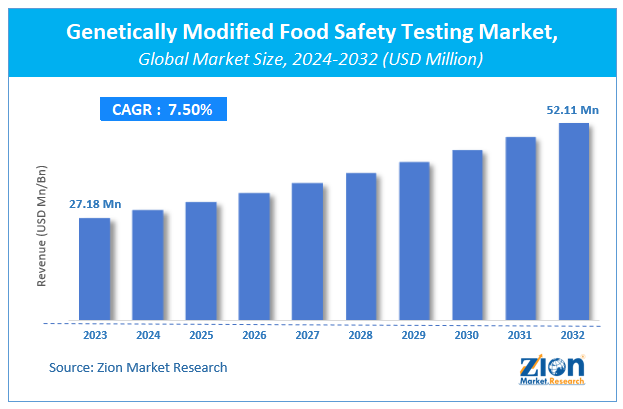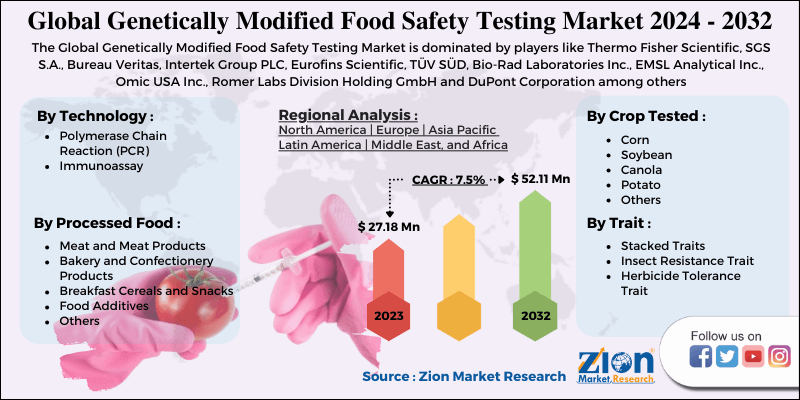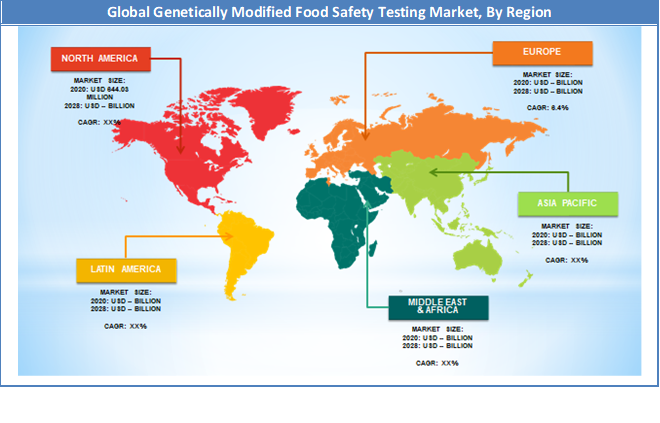Genetically Modified Food Safety Testing Market Size, Share, Trends, Growth 2032

Genetically Modified Food Safety Testing Market By Technology (Polymerase Chain Reaction and Immunoassay), By Trait (Stacked Traits, Insect Resistance Trait and Herbicide Tolerance Trait), By Crop Tested (Corn, Soybean, Canola, Potato and Others), By Processed Food Tested (Meat and Meat Products, Bakery and Confectionery Products, Breakfast Cereals and Snacks, Food Additives and Others) and By Region: Global Industry Perspective, Comprehensive Analysis and Forecast, 2024-2032
| Market Size in 2023 | Market Forecast in 2032 | CAGR (in %) | Base Year |
|---|---|---|---|
| USD 27.18 Million | USD 52.11 Million | 7.5% | 2023 |
Genetically Modified Food Safety Testing Market Insights
According to a report from Zion Market Research, the global Genetically Modified Food Safety Testing Market was valued at USD 27.18 Million in 2023 and is projected to hit USD 52.11 Million by 2032, with a compound annual growth rate (CAGR) of 7.5% during the forecast period 2024-2032. This report explores market strengths, weakness, opportunities, and threats. It also provides valuable insights into the market's growth drivers, challenges, and the future prospects that may emerge in the Genetically Modified Food Safety Testing Market industry over the next decade.
Genetically Modified Food Safety Testing Market: Overview
Genetically Modified Food can be described as food that has been altered by the insertion of genetic material from a different organism. This alteration is carried out to enhance food products by providing them with certain novel characteristics. As these altered food products contain genetic material from a different organism, they have to be tested and evaluated, for toxins, allergenic compounds, and harmful proteins, prior to their distribution and consumption. Genetically Modified Food Safety Testing involves testing of genetically altered crops and food products, wherein these crops are utilized.
Enhanced consumer awareness, stringent government regulations, increase in Research and Development activities, and changing lifestyles are some of the major factors that are augmenting the growth of the Genetically Modified Food Safety Testing market.
Genetically Modified Food Safety Testing Market: COVID-19 Impact Analysis Before the COVID-19 pandemic, companies in the genetically modified food safety testing market were expanding at a steady pace. However, during the pandemic, the food and beverage industry was negatively impacted. This can be accredited to the worldwide lockdown, travel bans, and business shutdowns.
Due to the lockdown, there was a disruption in the supply chain of food products, which had a significant impact on the food and beverage industry. Additionally, due to the shutdown of commercial and entertainment places such as restaurants, malls, and diners among others, demand for the food and beverage industry declined as well. All these factors had a negative impact on the genetically modified food safety testing market as the consumption and demand for genetically modified food products declined.
Genetically Modified Food Safety Testing Market: Growth Factors
Enhanced consumer awareness, stringent government regulations, an increase in Research and Development activities, and changing lifestyles are some of the major factors that drive the growth of the Genetically Modified Food Safety Testing market.
With changing lifestyles, consumers are concerned about health-related issues and are thus, focusing on consuming food products that are nutritionally beneficial for them. Additionally, with increased awareness, consumers are shifting from their normal food products to products that are free from chemicals and pesticides. This enhances the growth of genetically modified food products as they do not require insecticides or pesticides for their growth and are nutritionally enhanced.
Subsequently, governments across the world have stringent regulations and policies for the safety standards of genetically modified food products. This will drive the market for Genetically Modified Food Safety Testing, during the forecast period.
Genetically Modified Food Safety Testing Market: Technology Segment Analysis Preview
Multiple DNA extraction kits are available in the market. These kits make the extraction process quick and convenient. Additionally, these kits make it possible to extract pure and high-quality DNA from the raw materials of genetically modified crops such as seeds and certified reference materials. Subsequently, the results of PCR testing are highly reliable as they can be easily replicated. Furthermore, innovations such as Real-Time PCR, provide the results of testing procedures immediately. Owing to these features, PCR is widely utilized in the testing of Genetically Modified Food.
Genetically Modified Food Safety Testing Market: Segment Analysis Preview
The Stacked Traits segment is expected to reach a substantial CAGR between 2023 and 2032. Stacked Traits refer to the ability of the crop to possess more than one genetic modification. It helps them carry multiple traits/characteristics in a single variety of crops. They can be resistant to insects and pests, can show tolerance towards herbicides, and be nutritionally enhanced, all at the same time.
Owing to this, they are utilized for a wide range of applications. They are consumed as food products, used as feed in the animal husbandry segment, and utilized as ingredients for processed food. Increased demand and consumption of crops with stacked traits promote the testing of Genetically Modified Food for safety reasons.
Genetically Modified Food Safety Testing Market: Report Scope
| Report Attributes | Report Details |
|---|---|
| Report Name | Genetically Modified Food Safety Testing Market |
| Market Size in 2023 | USD 27.18 Million |
| Market Forecast in 2032 | USD 52.11 Million |
| Growth Rate | CAGR of 7.5% |
| Number of Pages | 180 |
| Key Companies Covered | Thermo Fisher Scientific, SGS S.A., Bureau Veritas, Intertek Group PLC, Eurofins Scientific, TÜV SÜD, Bio-Rad Laboratories Inc., EMSL Analytical Inc., Omic USA Inc., Romer Labs Division Holding GmbH and DuPont Corporation among others. |
| Segments Covered | By Technology, By Trait, By Crop Tested, By Processed Food Tested and By Region |
| Regions Covered | North America, Europe, Asia Pacific (APAC), Latin America, Middle East, and Africa (MEA) |
| Base Year | 2023 |
| Historical Year | 2018 to 2022 |
| Forecast Year | 2024 - 2032 |
| Customization Scope | Avail customized purchase options to meet your exact research needs. Request For Customization |
Genetically Modified Food Safety Testing Market: Regional Analysis Preview
This is attributable to the presence of major players like Thermo Fisher Scientific, Bio-Rad Laboratories Inc., EMSL Analytical Inc., and Omic USA Inc. among others. Additionally, the region is experiencing enhanced consumer awareness regarding the consumption of healthy and nutritious food products. Concerns regarding foodborne diseases and the ill impact of consuming contaminated or toxic food products are also on the rise. These factors promote food testing and thereby, enhance the market for Genetically Modified Food Safety Testing.
Furthermore, changes in lifestyle have resulted in increased consumption of processed food products and beverages. Subsequently, countries like the US and Canada have a large and well-established food industry, wherein processed food products hold a major segment. This will drive the growth of the Genetically Modified Food Safety Testing market, during the forecast period. The Europe region is anticipated to reach a significant CAGR between 2021 and 2028. This is attributable to enhanced consumer awareness and stringent government regulations.
Countries such as the UK, France, Germany, and Spain have stringent regulations and policies for genetically modified food. It has to meet certain prerequisites before it is released in the market for consumption. Owing to this, the Genetically Modified Food Safety Testing market is on the rise in the European region. Additionally, due to increased health awareness, consumers are focusing on food products that are free from chemicals such as pesticides, herbicides, and insecticides among others. Subsequently, consumption of food that is high in nutritional value is the new trend. This enhances the growth of the Genetically Modified Food Safety Testing market in the region as food products can be genetically modified to show increased levels of vitamins, minerals, and proteins.
Key Market Players & Competitive Landscape
Some of the key players in the Genetically Modified Food Safety Testing market are
- Thermo Fisher Scientific
- SGS S.A.
- Bureau Veritas
- Intertek Group PLC
- Eurofins Scientific
- TÜV SÜD
- Bio-Rad Laboratories Inc.
- EMSL Analytical Inc.
- Omic USA Inc.
- Romer Labs Division Holding GmbH
- DuPont Corporation
The global genetically modified food safety testing market is segmented as follows:
By Technology
- Polymerase Chain Reaction (PCR)
- Immunoassay
By Trait
- Stacked Traits
- Insect Resistance Trait
- Herbicide Tolerance Trait
By Crop Tested
- Corn
- Soybean
- Canola
- Potato
- Others
By Processed Food Tested
- Meat and Meat Products
- Bakery and Confectionery Products
- Breakfast Cereals and Snacks
- Food Additives
- Others
By Region
- North America
- The U.S.
- Canada
- Europe
- France
- The UK
- Spain
- Germany
- Italy
- Rest of Europe
- Asia Pacific
- China
- Japan
- India
- South Korea
- Southeast Asia
- Rest of Asia Pacific
- Latin America
- Brazil
- Mexico
- Rest of Latin America
- Middle East & Africa
- GCC
- South Africa
- Rest of Middle East & Africa
Table Of Content
Methodology
FrequentlyAsked Questions
According to a report from Zion Market Research, the global Genetically Modified Food Safety Testing Market was valued at USD 27.18 Million in 2023 and is projected to hit USD 52.11 Million by 2032.
According to a report from Zion Market Research, the global Genetically Modified Food Safety Testing Market a compound annual growth rate (CAGR) of 7.5% during the forecast period 2024-2032.
Some of the key factors driving the global Genetically Modified Food Safety Testing market growth are Enhanced consumer awareness, stringent government regulations, increase in Research and Development activities and changing lifestyles.
North America region held a substantial share of the genetically modified food safety testing market in 2020. This surge can be credited to the presence of major players like Thermo Fisher Scientific, Bio-Rad Laboratories Inc., EMSL Analytical Inc. and Omic USA Inc. among others, in the region.
Who are the major companies operating in the global genetically modified food safety testing market?
Some of the major companies operating in the genetically modified food safety testing market are Thermo Fisher Scientific, SGS S.A., Bureau Veritas, Intertek Group PLC, Eurofins Scientific, TÜV SÜD, Bio-Rad Laboratories Inc., EMSL Analytical Inc., Omic USA Inc., Romer Labs Division Holding GmbH and DuPont Corporation among others.
RelatedNews
HappyClients
Zion Market Research
Tel: +1 (302) 444-0166
USA/Canada Toll Free No.+1 (855) 465-4651
3rd Floor,
Mrunal Paradise, Opp Maharaja Hotel,
Pimple Gurav, Pune 411061,
Maharashtra, India
Phone No +91 7768 006 007, +91 7768 006 008
US OFFICE NO +1 (302) 444-0166
US/CAN TOLL FREE +1 (855) 465-4651
Email: sales@zionmarketresearch.com
We have secured system to process your transaction.
Our support available to help you 24 hours a day, five days a week.
Monday - Friday: 9AM - 6PM
Saturday - Sunday: Closed







